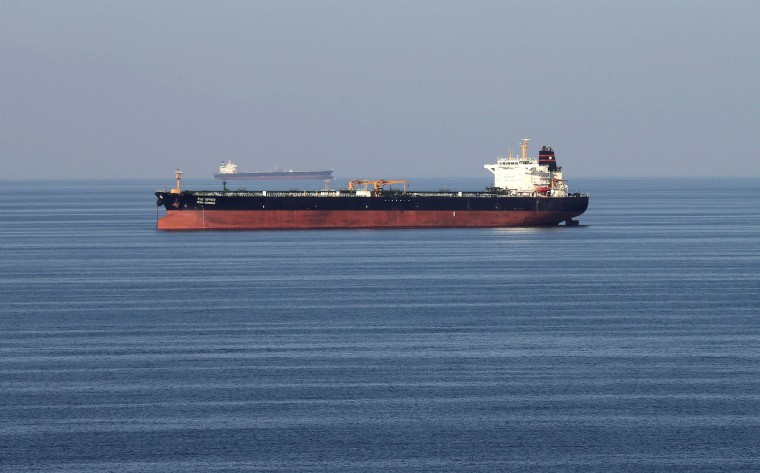TEHRAN — Iran's Revolutionary Guard forces have seized a foreign oil tanker accusing 12 crew members of smuggling oil, state TV reported Thursday.
The seizure comes amid heightened tensions between the United States and Iran after President Donald Trump withdrew from the 2015 nuclear deal — triggering Iran to start rolling back its commitments to the deal, a move Tehran says is reversible if sanctions are removed.
The ship was seized in Larak Island in the Strait of Hormuz, a strategic waterway off Iran's coast which separates the Persian Gulf from the Gulf of Oman, according to broadcaster IRIB. The report added the vessel had been towed after a distress call Sunday and was later seized for fuel smuggling.
The Revolutionary Guard said smugglers were transporting gasoline from Iran on small boats to a large tanker anchored outside Iranian territorial waters, IRIB reported, adding that the ship was carrying 1 million liters of the fuel.
The U.S. Fifth Fleet said it was aware of reports that Iran's Revolutionary Guard had seized a foreign oil tanker with 12 crew, but did not comment further. Lt. Col. Earl Brown, a spokesman for the U.S. Central Command, also said they were aware of the reports but did not comment further.
Download the NBC News app for breaking news and politics
In a statement, a State Department spokesperson said the U.S. "strongly condemns the Islamic Revolutionary Guard Corps Navy’s continued harassment of vessels and interference with safe passage in and around the Strait of Hormuz."
"Iran must cease this illicit activity and release the reportedly seized crew and vessel immediately. We will continue to work closely with our allies and partners to ensure the Iranian regime’s extortion tactics and malign activities do not further disrupt maritime security and global commerce," the spokesperson said.
The report didn't identify the tanker or say which country the crew were from. However, The Associated Press reported earlier this week that tracking data showed that an oil tanker based in the United Arab Emirates traveling through the strait drifted off into Iranian waters and stopped transmitting its location last weekend.
But an Emirati official told NBC News on Tuesday that the "tanker in question is neither UAE owned nor operated, does not carry Emirati personnel, and did not emit a distress call."
Iran's Revolutionary Guard is a powerful military branch of the Iranian government that has significant economic resources and answers only to the country's supreme leader. In April, the Trump administration designated the military unit as a foreign terrorist organization in the same category as al Qaeda and the Islamic State group, further ratcheting up tensions.
The incident is the latest to be reported in or near the Strait of Hormuz.
Earlier this month, several Iranian boats approached and attempted to stop a British commercial vessel sailing through the strait, but the Iranian vessels were driven away by a British military ship, a senior U.S. defense official and a British government spokesperson said.
The U.S. has also blamed Iran for what the military said was a limpet mine attack on two oil tankers in the Gulf of Oman in June. Iran has denied any involvement in the incident.
A third of the world's seaborne oil shipments, and 20 percent of oil traded worldwide, pass out of the Persian Gulf through the Strait.
The seizure of the ship comes amid heightened tensions between Iran and the United States since Trump pulled out of the 2015 Iran nuclear deal last year and imposed sanctions on Iran's beleaguered economy, including on its oil experts.
In June, the U.S. announced that it would send 1,000 troops to the Middle East to counter air, naval and ground-based threats in the region. Earlier this month, Iran began enriching uranium to 4.5 percent breaking the limit set by the nuclear deal.
Ali Arouzi reported from Tehran, Saphora Smith from London, Kurt Chirbas from New York and Mosheh Gains from Washington.


